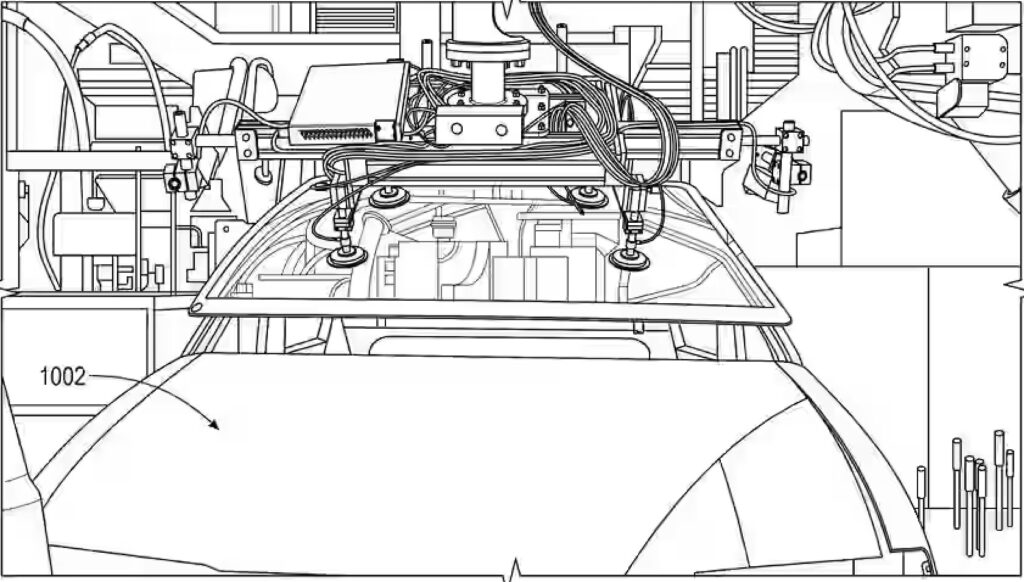Tesla has recently been granted a new U.S. patent for its innovative “True Unboxed Process 2.0,” a manufacturing technique that will play a key role in producing the highly anticipated Cybercab. This patent, officially known as US 12,420,879 B1, was approved and published after 16 months of filing.
The patented process involves a robotic assembly station equipped with vacuum clamps to secure car parts in place. Adhesive is then applied either to the part or the vehicle frame, with the robot pressing everything together based on a fixed reference point. This method allows for the adhesive to fill small gaps and start curing while workers simultaneously assemble other sections, resulting in a faster and more consistent production process. Tesla claims that this approach reduces the need for manual labor, improves accuracy, and ultimately accelerates vehicle manufacturing.
The Cybercab, Tesla’s upcoming two-seat, all-electric autonomous vehicle designed for its Robotaxi network, is set to benefit from this cutting-edge manufacturing process. Owners will eventually have the opportunity to add their Cybercabs and other Tesla vehicles to the ride-hailing fleet, facilitating rapid scalability of the service. The Cybercab is expected to feature unique upward-swinging scissor-style doors, a sleek minimalist design, and a purpose-built interior optimized for shared use.
Several hints about the Cybercab have emerged in recent months. The vehicle made a brief appearance in a Tesla promotional video for the Fourth of July, and gigacasting parts believed to be destined for the Cybercab were spotted at Gigafactory Texas earlier this year. Tesla has also been conducting tests with several prototypes around its Austin factory, including one model with a steering wheel, although the final version is projected to be fully autonomous.
While a specific production timeline for the Cybercab remains uncertain, the approval of this patent signifies significant progress toward Tesla’s objective of deploying a high-volume, low-cost Robotaxi fleet. With the Unboxed Process at the core of its manufacturing strategy, Tesla is laying the groundwork for what could be one of its most revolutionary vehicles yet. The COVID-19 pandemic has brought about unprecedented changes to our daily lives, affecting everything from the way we work and socialize to how we shop for groceries. As countries around the world continue to grapple with the challenges posed by the virus, one thing has become abundantly clear: the way we live, work, and interact with others has been forever altered.
One of the most noticeable changes brought about by the pandemic is the way we shop for essentials like groceries. With social distancing measures in place and concerns about the spread of the virus, many people have turned to online grocery shopping as a safer alternative to visiting physical stores. This shift has led to a surge in demand for online grocery delivery services, with companies like Instacart and Amazon Fresh seeing a significant increase in orders.
In addition to the rise in online grocery shopping, the pandemic has also led to changes in the way physical grocery stores operate. Many stores have implemented new safety measures, such as requiring customers to wear masks and limiting the number of people allowed inside at a time. Some stores have also introduced contactless payment options and increased sanitation efforts to help prevent the spread of the virus.
The pandemic has also highlighted the importance of supporting local businesses, including small grocery stores and farmers markets. As supply chains were disrupted and larger grocery chains struggled to keep up with demand, many people turned to local businesses for their grocery needs. This shift has not only helped support small businesses during a challenging time but has also allowed consumers to access fresh, locally sourced produce and other goods.
Looking ahead, it’s clear that the pandemic will continue to have a lasting impact on the way we shop for groceries. Online shopping is likely to remain a popular option for many consumers, especially those who are at higher risk for COVID-19 or who prefer the convenience of having groceries delivered to their doorstep. Physical stores will also continue to adapt to the new normal, implementing safety measures and new technologies to make the shopping experience as safe and convenient as possible.
Ultimately, the COVID-19 pandemic has forced us to reevaluate the way we shop for groceries and has highlighted the importance of supporting local businesses and adapting to changing circumstances. As we continue to navigate these challenging times, it’s clear that the way we shop for groceries will never be the same again.

